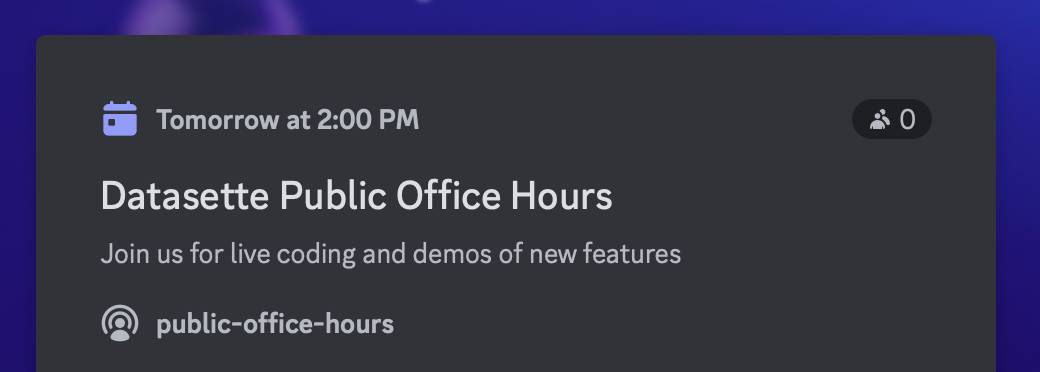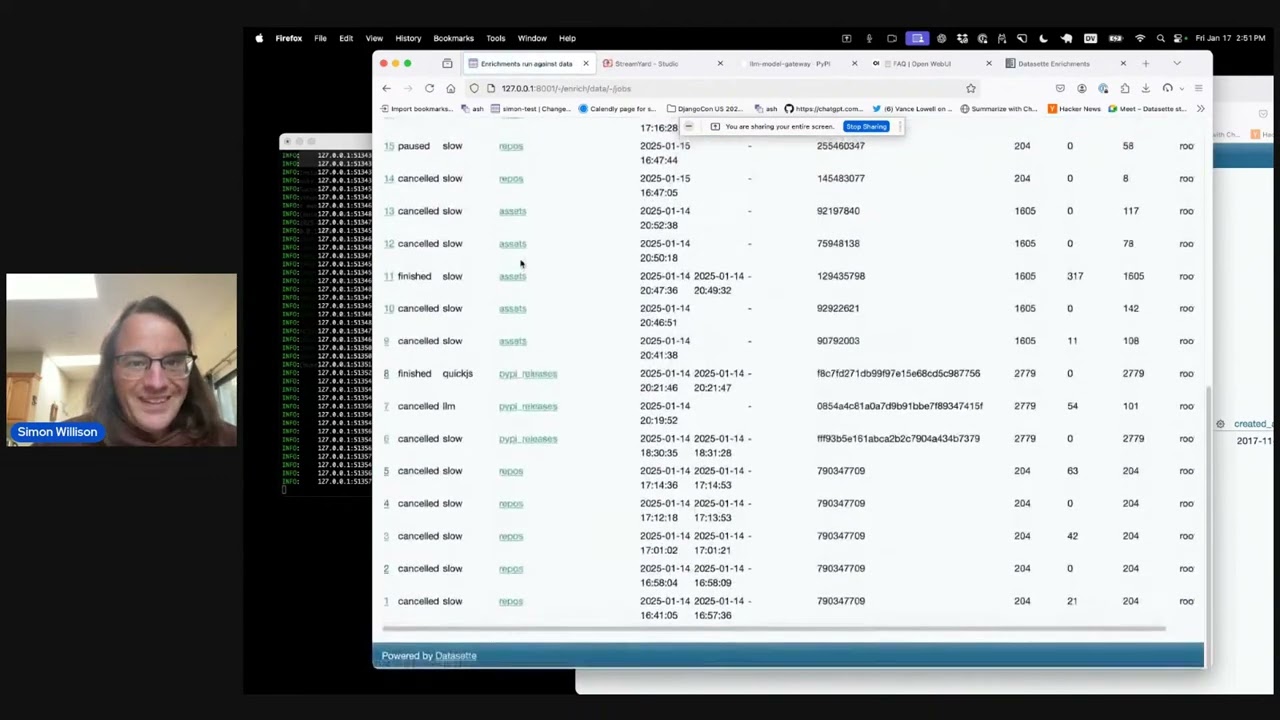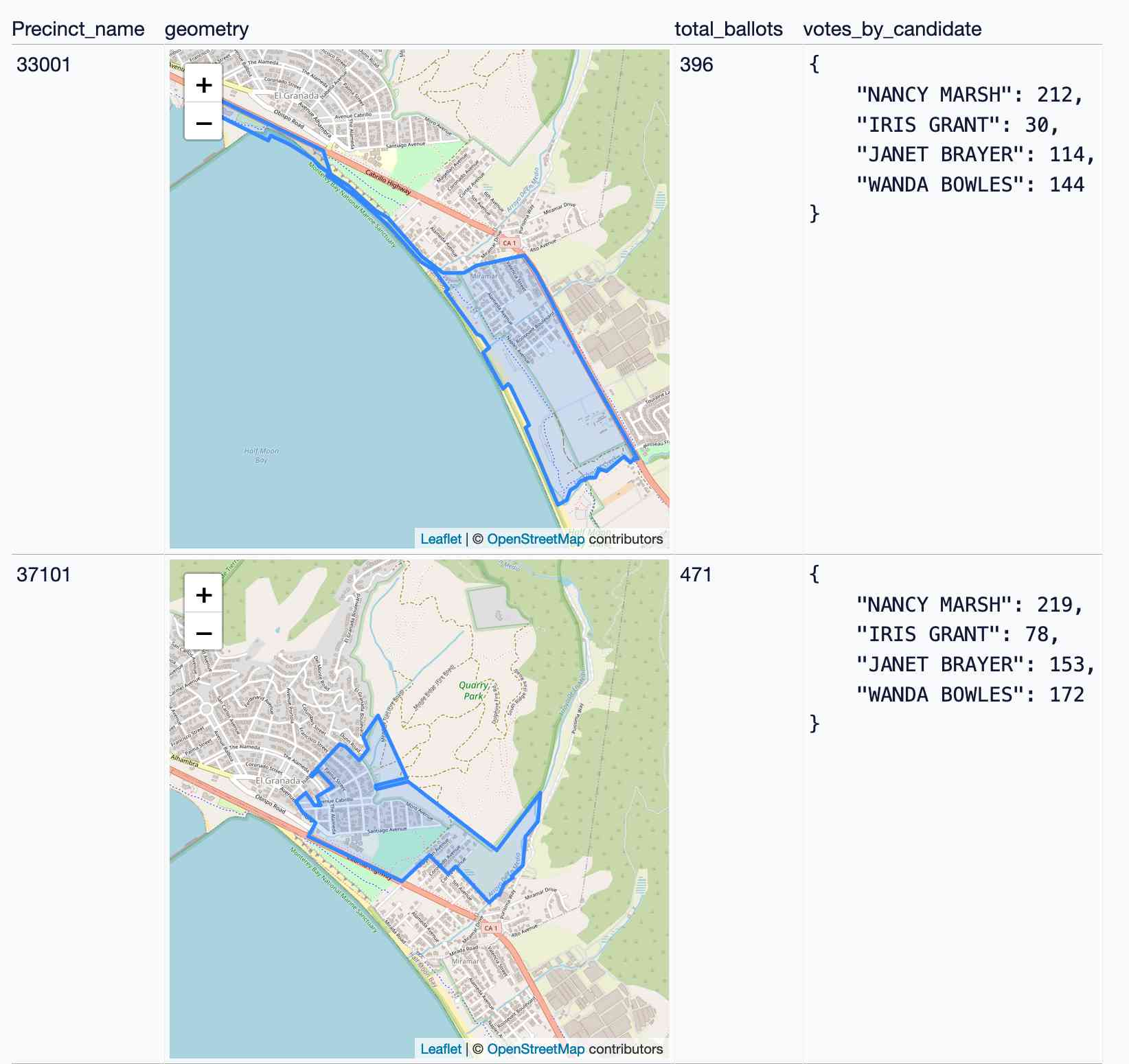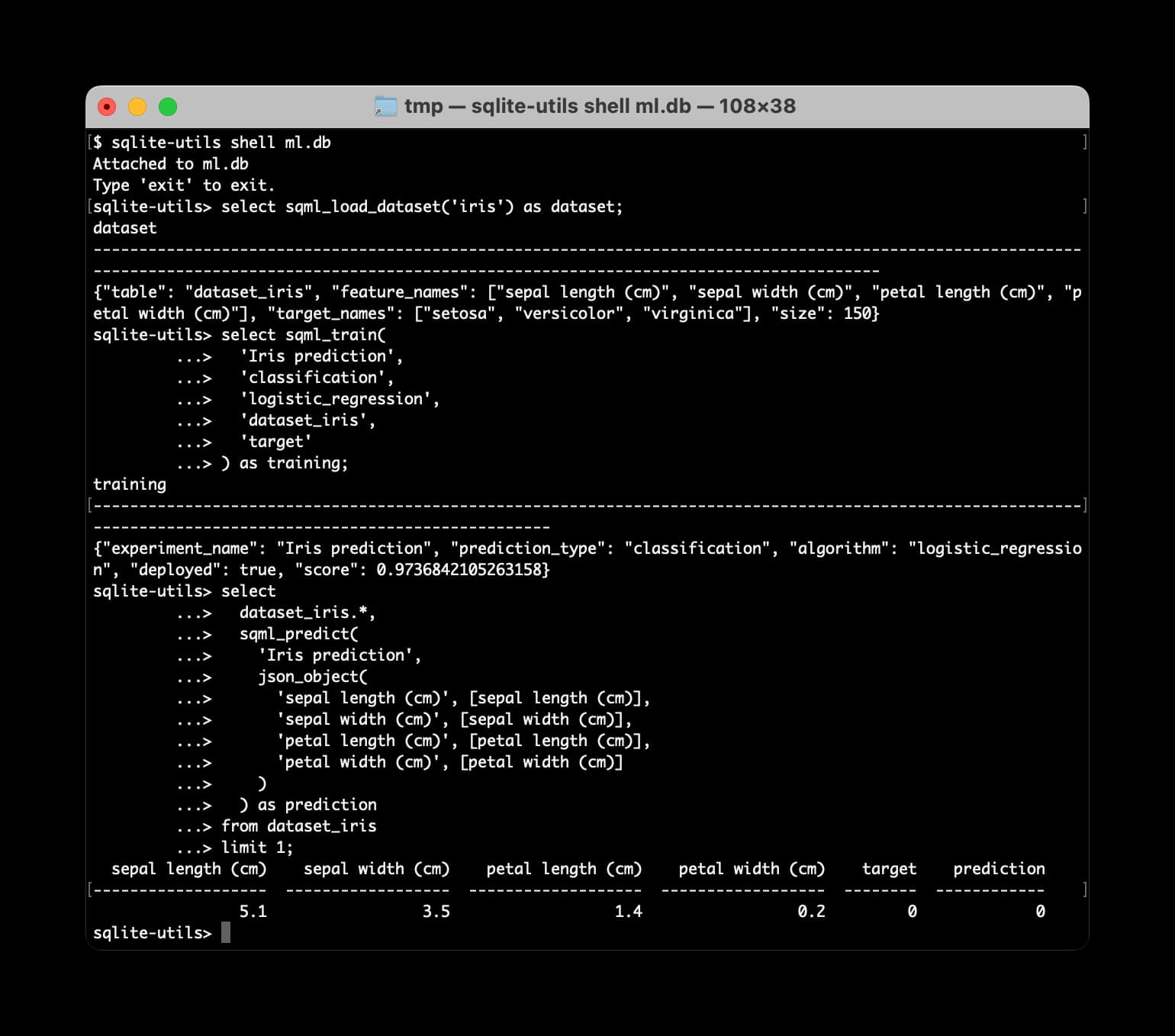31 posts tagged “alex-garcia”
2025
Six short video demos of LLM and Datasette projects
Last Friday Alex Garcia and I hosted a new kind of Datasette Public Office Hours session, inviting members of the Datasette community to share short demos of projects that they had built. The session lasted just over an hour and featured demos from six different people.
[... 1,047 words]2024
Visualizing local election results with Datasette, Observable and MapLibre GL
Alex Garcia and myself hosted the first Datasette Open Office Hours on Friday—a live-streamed video session where we hacked on a project together and took questions and tips from community members on Discord.
[... 3,390 words]Datasette Public Office Hours, Friday Nov 8th at 2pm PT. Tomorrow afternoon (Friday 8th November) at 2pm PT we'll be hosting the first Datasette Public Office Hours - a livestream video session on Discord where Alex Garcia and myself will live code on some Datasette projects and hang out to chat about the project.
This is our first time trying this format. If it works out well I plan to turn it into a series.

Hybrid full-text search and vector search with SQLite. As part of Alex’s work on his sqlite-vec SQLite extension - adding fast vector lookups to SQLite - he’s been investigating hybrid search, where search results from both vector similarity and traditional full-text search are combined together.
The most promising approach looks to be Reciprocal Rank Fusion, which combines the top ranked items from both approaches. Here’s Alex’s SQL query:
-- the sqlite-vec KNN vector search results
with vec_matches as (
select
article_id,
row_number() over (order by distance) as rank_number,
distance
from vec_articles
where
headline_embedding match lembed(:query)
and k = :k
),
-- the FTS5 search results
fts_matches as (
select
rowid,
row_number() over (order by rank) as rank_number,
rank as score
from fts_articles
where headline match :query
limit :k
),
-- combine FTS5 + vector search results with RRF
final as (
select
articles.id,
articles.headline,
vec_matches.rank_number as vec_rank,
fts_matches.rank_number as fts_rank,
-- RRF algorithm
(
coalesce(1.0 / (:rrf_k + fts_matches.rank_number), 0.0) * :weight_fts +
coalesce(1.0 / (:rrf_k + vec_matches.rank_number), 0.0) * :weight_vec
) as combined_rank,
vec_matches.distance as vec_distance,
fts_matches.score as fts_score
from fts_matches
full outer join vec_matches on vec_matches.article_id = fts_matches.rowid
join articles on articles.rowid = coalesce(fts_matches.rowid, vec_matches.article_id)
order by combined_rank desc
)
select * from final;I’ve been puzzled in the past over how to best do that because the distance scores from vector similarity and the relevance scores from FTS are meaningless in comparison to each other. RRF doesn’t even attempt to compare them - it uses them purely for row_number() ranking within each set and combines the results based on that.
Using sqlite-vec with embeddings in sqlite-utils and Datasette. My notes on trying out Alex Garcia's newly released sqlite-vec SQLite extension, including how to use it with OpenAI embeddings in both Datasette and sqlite-utils.
Introducing sqlite-lembed: A SQLite extension for generating text embeddings locally (via) Alex Garcia's latest SQLite extension is a C wrapper around the llama.cpp that exposes just its embedding support, allowing you to register a GGUF file containing an embedding model:
INSERT INTO temp.lembed_models(name, model)
select 'all-MiniLM-L6-v2',
lembed_model_from_file('all-MiniLM-L6-v2.e4ce9877.q8_0.gguf');
And then use it to calculate embeddings as part of a SQL query:
select lembed(
'all-MiniLM-L6-v2',
'The United States Postal Service is an independent agency...'
); -- X'A402...09C3' (1536 bytes)
all-MiniLM-L6-v2.e4ce9877.q8_0.gguf here is a 24MB file, so this should run quite happily even on machines without much available RAM.
What if you don't want to run the models locally at all? Alex has another new extension for that, described in Introducing sqlite-rembed: A SQLite extension for generating text embeddings from remote APIs. The rembed is for remote embeddings, and this extension uses Rust to call multiple remotely-hosted embeddings APIs, registered like this:
INSERT INTO temp.rembed_clients(name, options)
VALUES ('text-embedding-3-small', 'openai');
select rembed(
'text-embedding-3-small',
'The United States Postal Service is an independent agency...'
); -- X'A452...01FC', Blob<6144 bytes>
Here's the Rust code that implements Rust wrapper functions for HTTP JSON APIs from OpenAI, Nomic, Cohere, Jina, Mixedbread and localhost servers provided by Ollama and Llamafile.
Both of these extensions are designed to complement Alex's sqlite-vec extension, which is nearing a first stable release.
sqlite-jiff
(via)
I linked to the brand new Jiff datetime library yesterday. Alex Garcia has already used it for an experimental SQLite extension providing a timezone-aware jiff_duration() function - a useful new capability since SQLite's built in date functions don't handle timezones at all.
select jiff_duration(
'2024-11-02T01:59:59[America/Los_Angeles]',
'2024-11-02T02:00:01[America/New_York]',
'minutes'
) as result; -- returns 179.966
The implementation is 65 lines of Rust.
datasette-pins — a new Datasette plugin for pinning tables and queries. Alex Garcia built this plugin for Datasette Cloud, and as with almost every Datasette Cloud features we're releasing it as an open source package as well.
datasette-pins allows users with the right permission to "pin" tables, databases and queries to their homepage. It's a lightweight way to customize that homepage, especially useful as your Datasette instance grows to host dozens or even hundreds of tables.
I’m writing a new vector search SQLite Extension.
Alex Garcia is working on sqlite-vec, a spiritual successor to his sqlite-vss project. The new SQLite C extension will have zero other dependencies (sqlite-vss used some tricky C++ libraries) and will work using virtual tables, storing chunks of vectors in shadow tables to avoid needing to load everything into memory at once.
2023
datasette-plot—a new Datasette Plugin for building data visualizations. I forgot to link to this here last week: Alex Garcia released the first version of datasette-plot, a brand new Datasette visualization plugin built on top of the Observable Plot charting library. We plan to use this as the new, updated alternative to my older datasette-vega plugin.
Annotate and explore your data with datasette-comments. New plugin for Datasette and Datasette Cloud: datasette-comments, providing tools for collaborating on data exploration with a team through posting comments on individual rows of data.
Alex Garcia built this for Datasette Cloud but as with almost all of our work there it’s also available as an open source Python package.
Weeknotes: the Datasette Cloud API, a podcast appearance and more
Datasette Cloud now has a documented API, plus a podcast appearance, some LLM plugins work and some geospatial excitement.
[... 1,243 words]Geospatial SQL queries in SQLite using TG, sqlite-tg and datasette-sqlite-tg. Alex Garcia built sqlite-tg—a SQLite extension that uses the brand new TG geospatial library to provide a whole suite of custom SQL functions for working with geospatial data.
Here are my notes on trying out his initial alpha releases. The extension already provides tools for converting between GeoJSON, WKT and WKB, plus the all important tg_intersects() function for testing if a polygon or point overlap each other.
It’s pretty useful already. Without any geospatial indexing at all I was still able to get 700ms replies to a brute-force point-in-polygon query against 150MB of GeoJSON timezone boundaries stored as JSON text in a table.
Weeknotes: Embeddings, more embeddings and Datasette Cloud
Since my last weeknotes, a flurry of activity. LLM has embeddings support now, and Datasette Cloud has driven some major improvements to the wider Datasette ecosystem.
[... 2,427 words]Introducing datasette-litestream: easy replication for SQLite databases in Datasette. We use Litestream on Datasette Cloud for streaming backups of user data to S3. Alex Garcia extracted out our implementation into a standalone Datasette plugin, which bundles the Litestream Go binary (for the relevant platform) in the package you get when you run “datasette install datasette-litestream”—so now Datasette has a very robust answer to questions about SQLite disaster recovery beyond just the Datasette Cloud platform.
Datasette 1.0a4 and 1.0a5, plus weeknotes
Two new alpha releases of Datasette, plus a keynote at WordCamp, a new LLM release, two new LLM plugins and a flurry of TILs.
[... 2,709 words]Introducing datasette-write-ui: a Datasette plugin for editing, inserting, and deleting rows. Alex García is working with me on Datasette Cloud for the next few months, graciously sponsored by Fly. We will be working in public, releasing open source code and documenting how to build a multi-tenant SaaS product using Fly Machines.
Alex’s first project is datasette-write-ui, a plugin that finally lets you directly edit data stored inside Datasette. Alex wrote about the plugin on our new Datasette Cloud blog.
sqlite-utils now supports plugins
sqlite-utils 3.34 is out with a major new feature: support for plugins.
[... 1,327 words]sqlite-vss v0.1.1 Annotated Release Notes (via) Alex Garcia’s sqlite-vss adds vector search directly to SQLite through a custom extension. It’s now easily installed for Python, Node.js, Deno, Elixir, Go, Rust and Ruby (“gem install sqlite-vss”), and is being used actively by enough people that Alex is getting actionable feedback, including fixes for memory leaks spotted in production.
Making SQLite extensions npm install’able for Node.js, and on deno.land/x for Deno (via) Alex Garcia figured out how to get his “pip install X” trick for distributing compiled SQLite extensions to work for Node too! Now you can “npm install” 10 of his extensions, including sqlite-regex and sqlite-xsv and sqlite-http and sqlite-html and more, and attach them to a node-sqlite3 or better-sqlite3 connection. He’s bundled them for Deno too!
Introducing sqlite-vss: A SQLite Extension for Vector Search (via) This latest SQLite extension from Alex Garcia is possibly his best yet: it adds FAISS-powered vector similarity search directly to SQLite, enabling fast KNN similarity lookups against a virtual table that feels a lot like SQLite’s own built-in full text search feature. This write-up includes interactive demos using Datasette called from an Observable notebook, running similarity searches against an index of 200,000 news headlines and summaries in less than 50ms.
Making SQLite extensions pip install-able (via) Alex Garcia figured out how to bundle a compiled SQLite extension in a Python wheel (building different wheels for different platforms) and publish them to PyPI. This is a huge leap forward in terms of the usability of SQLite extensions, which have previously been pretty difficult to actually install and run. Alex also created Datasette plugins that depend on his packages, so you can now “datasette install datasette-sqlite-regex” (or datasette-sqlite-ulid, datasette-sqlite-fastrand, datasette-sqlite-jsonschema) to gain access to his custom SQLite extensions in your Datasette instance. It even works with “datasette publish --install” to deploy to Vercel, Fly.io and Cloud Run.
sqlite-jsonschema. “A SQLite extension for validating JSON objects with JSON Schema”, building on the jsonschema Rust crate. SQLite and JSON are already a great combination—Alex suggests using this extension to implement check constraints to validate JSON columns before inserting into a table, or just to run queries finding existing data that doesn’t match a given schema.
sqlite-ulid. Alex Garcia’s sqlite-ulid adds lightning-fast SQL functions for generating ULIDs—Universally Unique Lexicographically Sortable Identifiers. These work like UUIDs but are smaller and faster to generate, and can be canonically encoded as a URL-safe 26 character string (UUIDs are 36 characters). Again, this builds on a Rust crate—ulid-rs—and can generate 1 million byte-represented ULIDs with the ulid_bytes() function in just 88.4ms.
sqlite-fastrand. Alex Garcia just dropped three new SQLite extensions, and I’m going to link to all of them. The first is sqlite-fastrand, which adds new functions for generating random numbers (and alphanumeric characters too). Impressively, these out-perform the default SQLite random() and randomblob() functions by about 1.6-2.6x, thanks to being built on the Rust fastrand crate which builds on wyhash, an extremely fast (though not cryptographically secure) hashing function.
Introducing sqlite-xsv: The Fastest CSV Parser for SQLite. Alex Garcia continues to push the boundaries of SQLite extensions. This new extension in Rust wraps the lightning fast Rust csv crate and provides a new csv_reader() virtual table that can handle regular, gzipped and zstd compressed files.
2022
Introducing sqlite-loadable-rs: A framework for building SQLite Extensions in Rust. Alex Garcia has built a new Rust library for creating SQLite extensions—initially supporting custom scalar functions, virtual tables and table functions and with more types of extension coming soon. This looks very easy to use, partly because the documentation and examples are already delightfully thorough, especially for an initial release.
Introducing sqlite-http: A SQLite extension for making HTTP requests (via) Characteristically thoughtful SQLite extension from Alex, following his sqlite-html extension from a few days ago. sqlite-http lets you make HTTP requests from SQLite—both as a SQL function that returns a string, and as a table-valued SQL function that lets you independently access the body, headers and even the timing data for the request.
This write-up is excellent: it provides interactive demos but also shows how additional SQLite extensions such as the new-to-me “define” extension can be combined with sqlite-http to create custom functions for parsing and processing HTML.
Introducing sqlite-html: query, parse, and generate HTML in SQLite (via) Another brilliant SQLite extension module from Alex Garcia, this time written in Go. sqlite-html adds a whole family of functions to SQLite for parsing and constructing HTML strings, built on the Go goquery and cascadia libraries. Once again, Alex uses an Observable notebook to describe the new features, with embedded interactive examples that are backed by a Datasette instance running in Fly.
Introducing sqlite-lines—a SQLite extension for reading files line-by-line (via) Alex Garcia wrote a brilliant C module for SQLIte which adds functions (and a table-valued function) for efficiently reading newline-delimited text into SQLite. When combined with SQLite’s built-in JSON features this means you can read a huge newline-delimited JSON file into SQLite in a streaming fashion so it doesn’t exhaust memory for a large file. Alex also compiled the extension to WebAssembly, and his post here is an Observable notebook post that lets you exercise the code directly.


